HA1011 Applied Quantitative Methods Assignment: Statistical Analysis
VerifiedAdded on 2021/06/17
|14
|1059
|27
Homework Assignment
AI Summary
This document presents a comprehensive solution to an Applied Quantitative Methods assignment (HA1011), addressing various statistical concepts and calculations. The solution includes detailed explanations and calculations for frequency distributions, histograms, and measures of central tende...
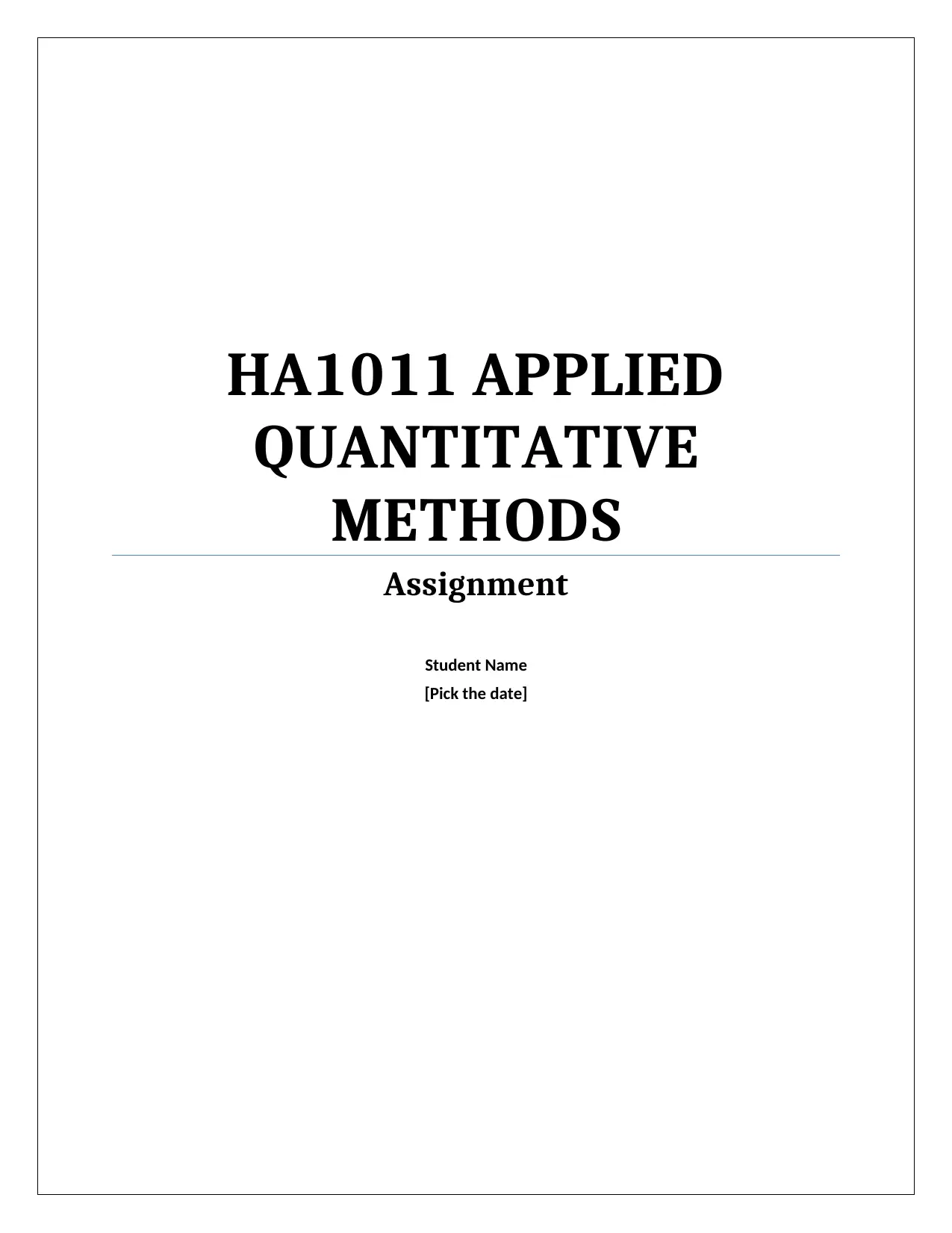
HA1011 APPLIED
QUANTITATIVE
METHODS
Assignment
Student Name
[Pick the date]
QUANTITATIVE
METHODS
Assignment
Student Name
[Pick the date]
Paraphrase This Document
Need a fresh take? Get an instant paraphrase of this document with our AI Paraphraser
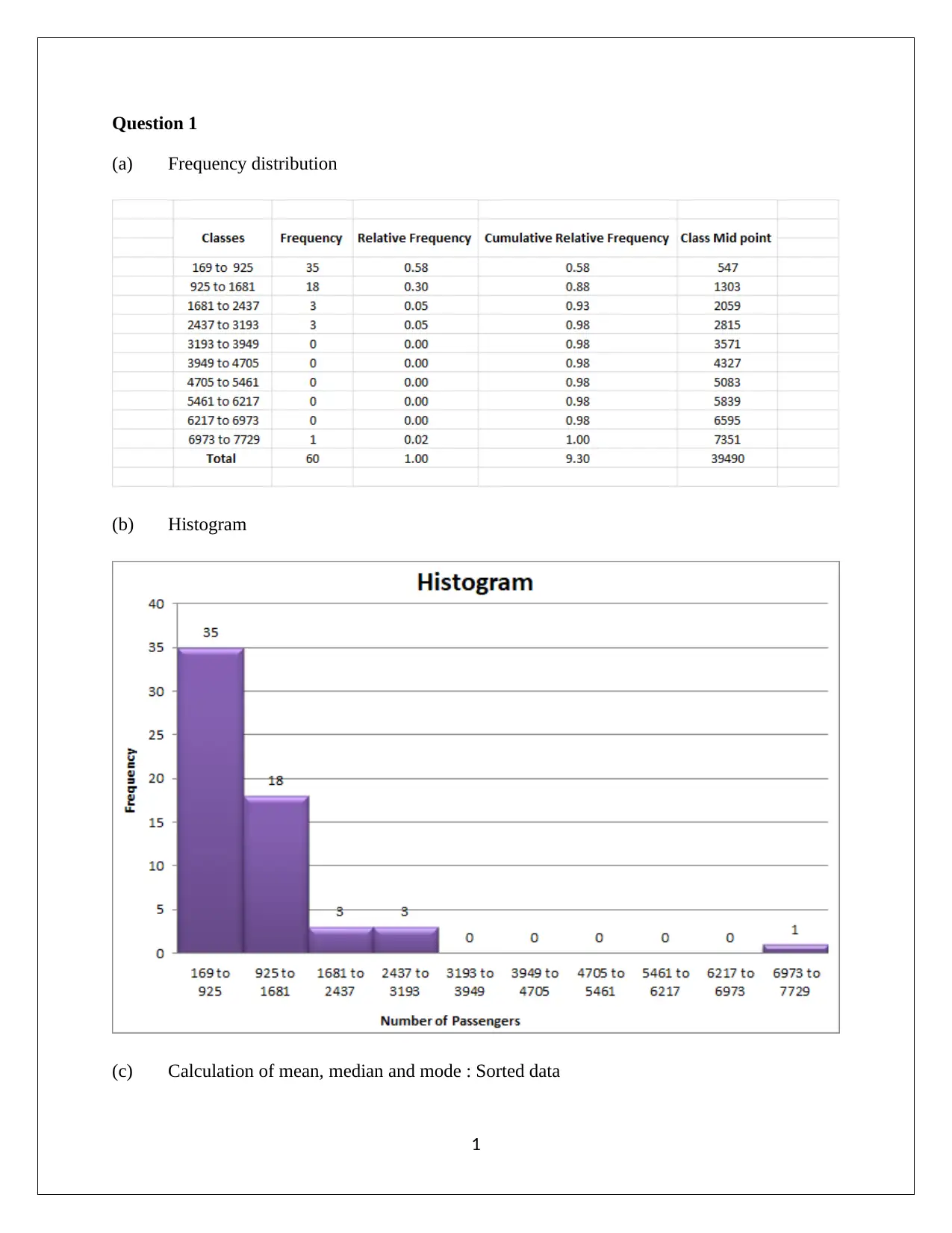
Question 1
(a) Frequency distribution
(b) Histogram
(c) Calculation of mean, median and mode : Sorted data
1
(a) Frequency distribution
(b) Histogram
(c) Calculation of mean, median and mode : Sorted data
1
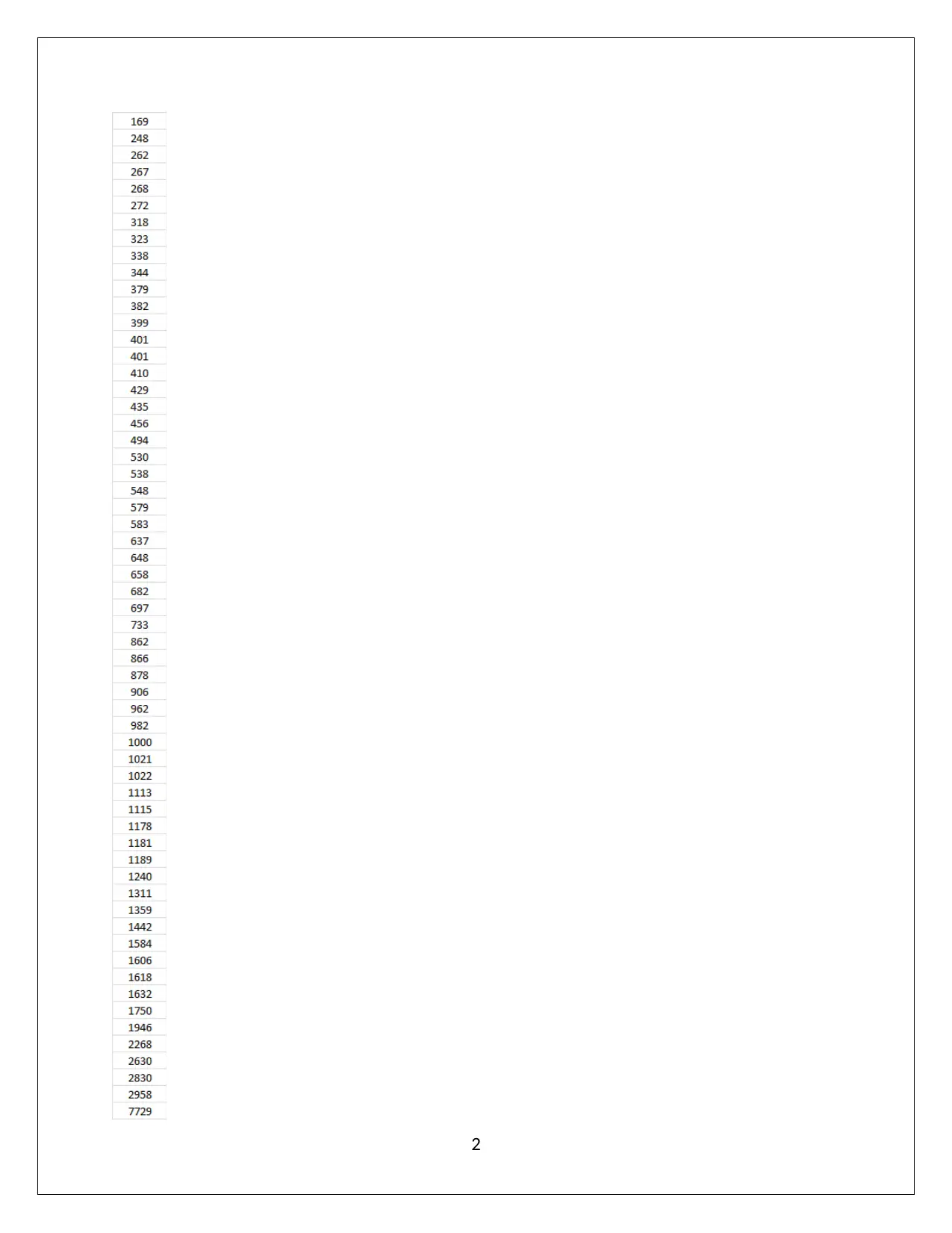
2
You're viewing a preview
Unlock full access by subscribing today!
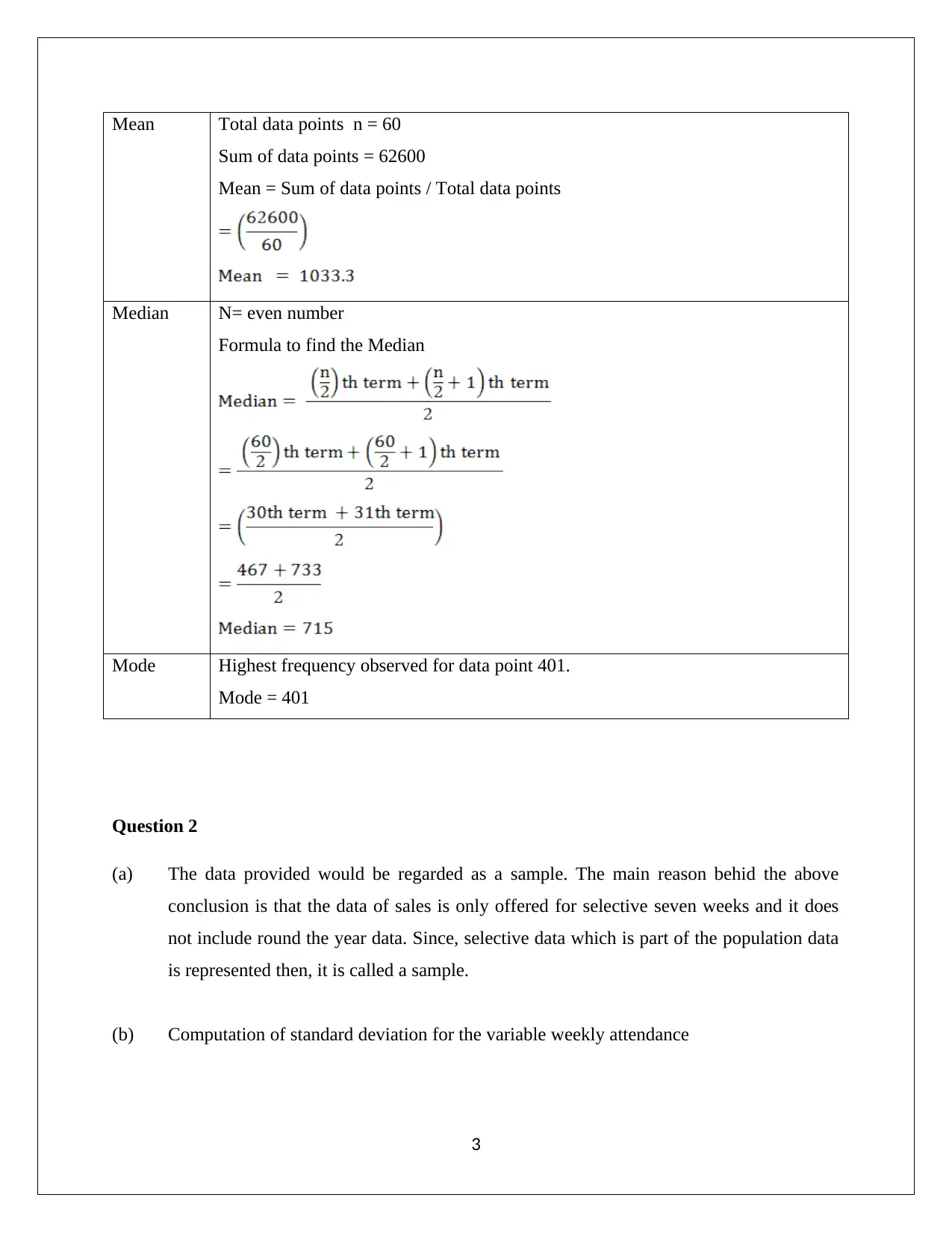
Mean Total data points n = 60
Sum of data points = 62600
Mean = Sum of data points / Total data points
Median N= even number
Formula to find the Median
Mode Highest frequency observed for data point 401.
Mode = 401
Question 2
(a) The data provided would be regarded as a sample. The main reason behid the above
conclusion is that the data of sales is only offered for selective seven weeks and it does
not include round the year data. Since, selective data which is part of the population data
is represented then, it is called a sample.
(b) Computation of standard deviation for the variable weekly attendance
3
Sum of data points = 62600
Mean = Sum of data points / Total data points
Median N= even number
Formula to find the Median
Mode Highest frequency observed for data point 401.
Mode = 401
Question 2
(a) The data provided would be regarded as a sample. The main reason behid the above
conclusion is that the data of sales is only offered for selective seven weeks and it does
not include round the year data. Since, selective data which is part of the population data
is represented then, it is called a sample.
(b) Computation of standard deviation for the variable weekly attendance
3
Paraphrase This Document
Need a fresh take? Get an instant paraphrase of this document with our AI Paraphraser
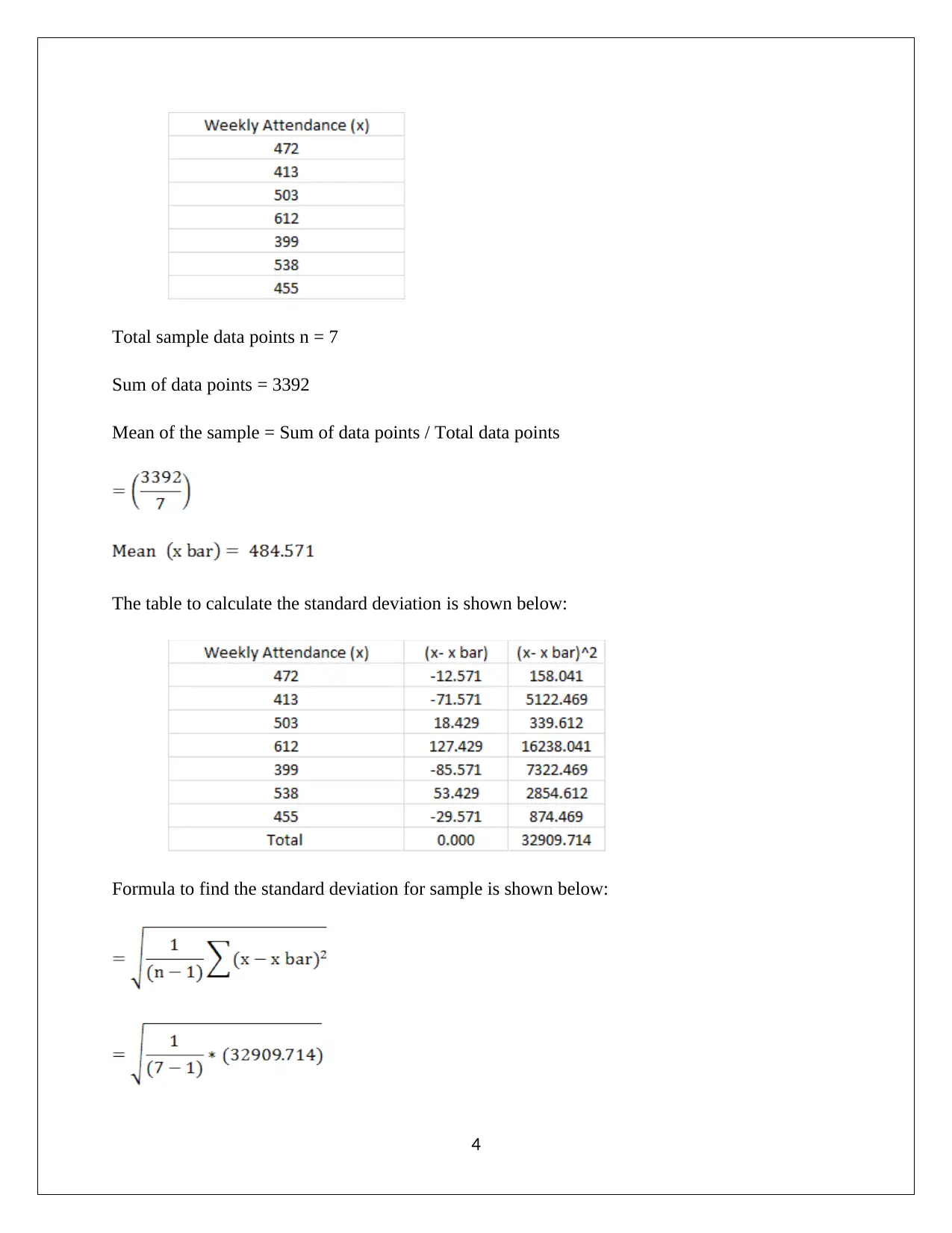
Total sample data points n = 7
Sum of data points = 3392
Mean of the sample = Sum of data points / Total data points
The table to calculate the standard deviation is shown below:
Formula to find the standard deviation for sample is shown below:
4
Sum of data points = 3392
Mean of the sample = Sum of data points / Total data points
The table to calculate the standard deviation is shown below:
Formula to find the standard deviation for sample is shown below:
4
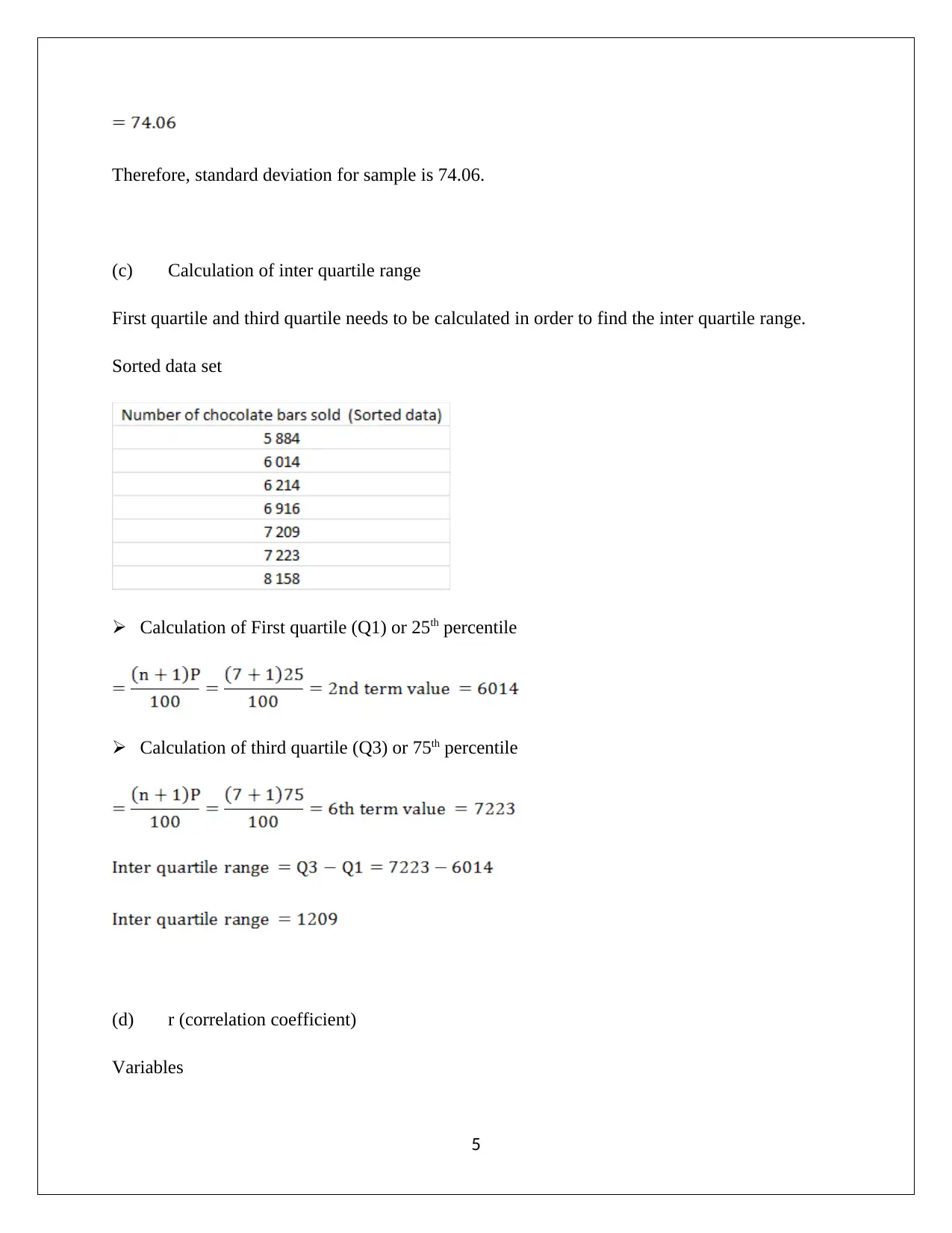
Therefore, standard deviation for sample is 74.06.
(c) Calculation of inter quartile range
First quartile and third quartile needs to be calculated in order to find the inter quartile range.
Sorted data set
Calculation of First quartile (Q1) or 25th percentile
Calculation of third quartile (Q3) or 75th percentile
(d) r (correlation coefficient)
Variables
5
(c) Calculation of inter quartile range
First quartile and third quartile needs to be calculated in order to find the inter quartile range.
Sorted data set
Calculation of First quartile (Q1) or 25th percentile
Calculation of third quartile (Q3) or 75th percentile
(d) r (correlation coefficient)
Variables
5
You're viewing a preview
Unlock full access by subscribing today!
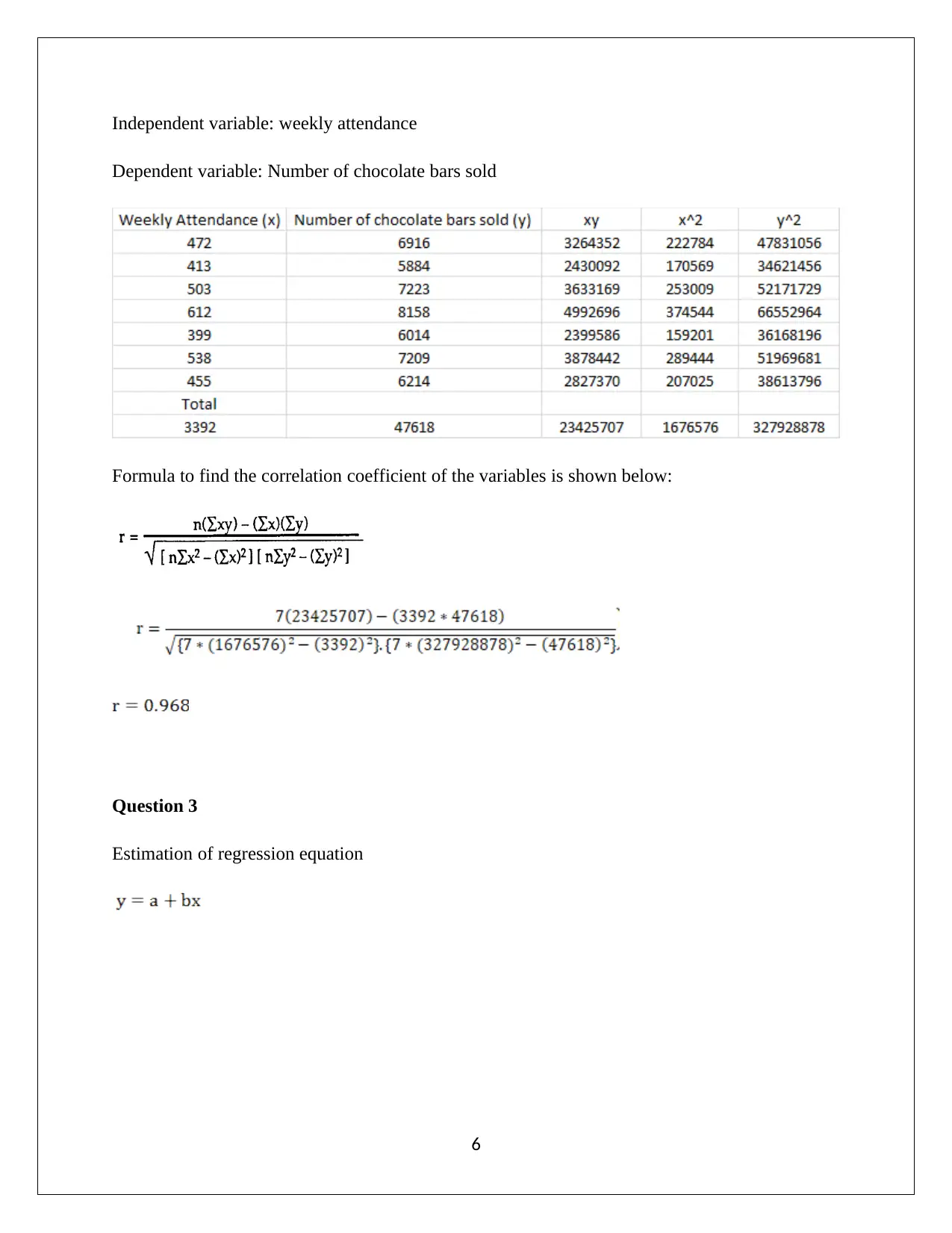
Independent variable: weekly attendance
Dependent variable: Number of chocolate bars sold
Formula to find the correlation coefficient of the variables is shown below:
Question 3
Estimation of regression equation
6
Dependent variable: Number of chocolate bars sold
Formula to find the correlation coefficient of the variables is shown below:
Question 3
Estimation of regression equation
6
Paraphrase This Document
Need a fresh take? Get an instant paraphrase of this document with our AI Paraphraser
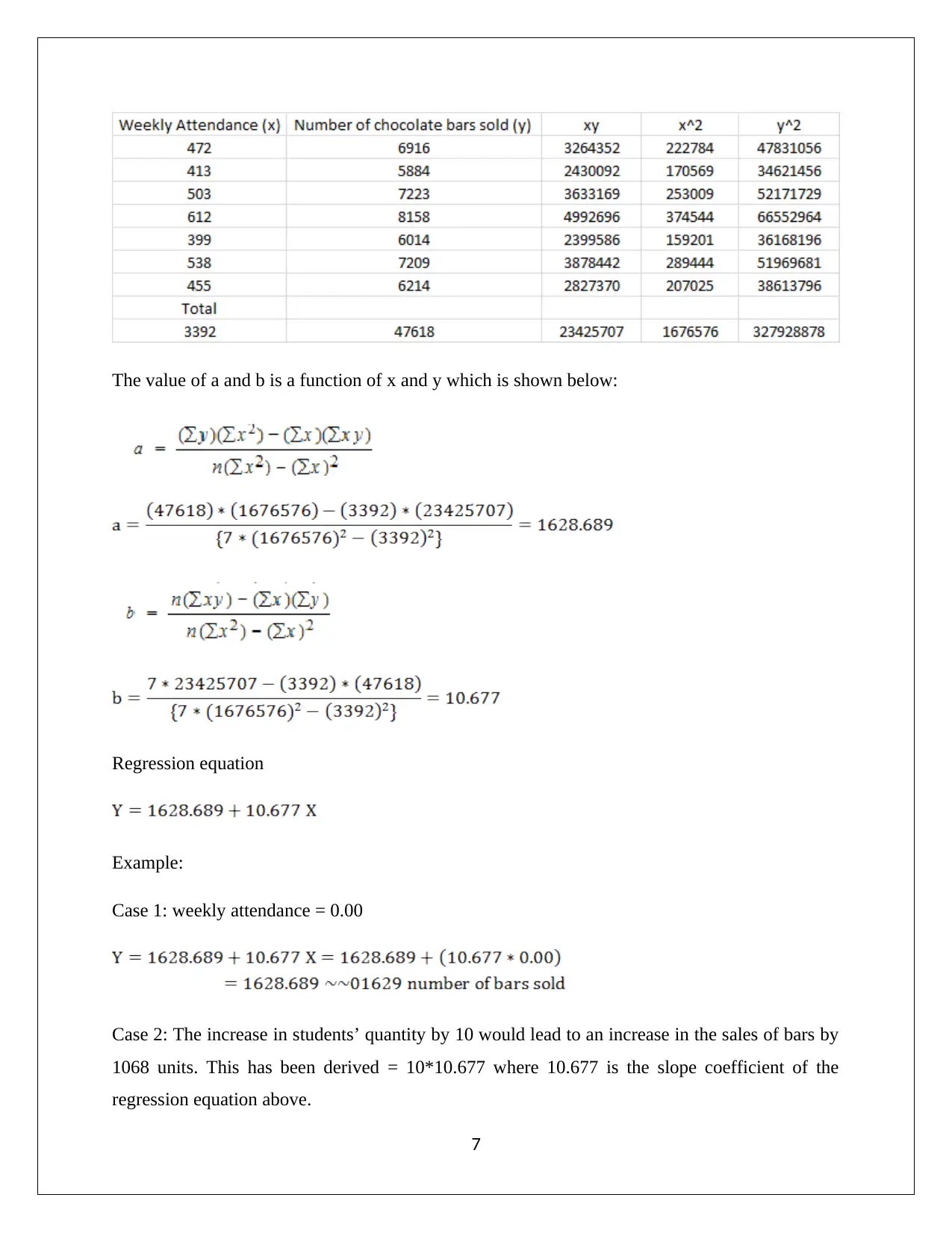
The value of a and b is a function of x and y which is shown below:
Regression equation
Example:
Case 1: weekly attendance = 0.00
Case 2: The increase in students’ quantity by 10 would lead to an increase in the sales of bars by
1068 units. This has been derived = 10*10.677 where 10.677 is the slope coefficient of the
regression equation above.
7
Regression equation
Example:
Case 1: weekly attendance = 0.00
Case 2: The increase in students’ quantity by 10 would lead to an increase in the sales of bars by
1068 units. This has been derived = 10*10.677 where 10.677 is the slope coefficient of the
regression equation above.
7
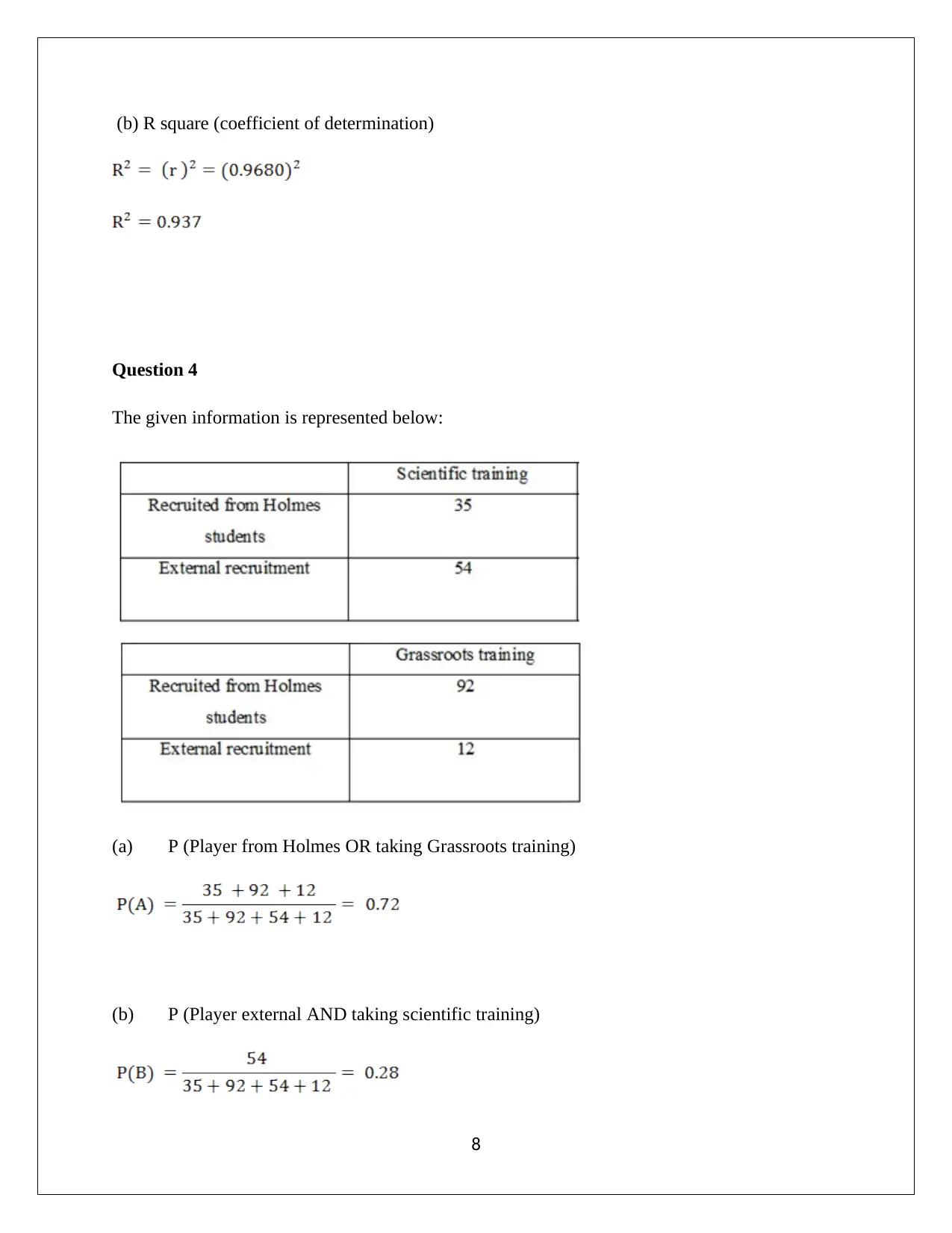
(b) R square (coefficient of determination)
Question 4
The given information is represented below:
(a) P (Player from Holmes OR taking Grassroots training)
(b) P (Player external AND taking scientific training)
8
Question 4
The given information is represented below:
(a) P (Player from Holmes OR taking Grassroots training)
(b) P (Player external AND taking scientific training)
8
You're viewing a preview
Unlock full access by subscribing today!
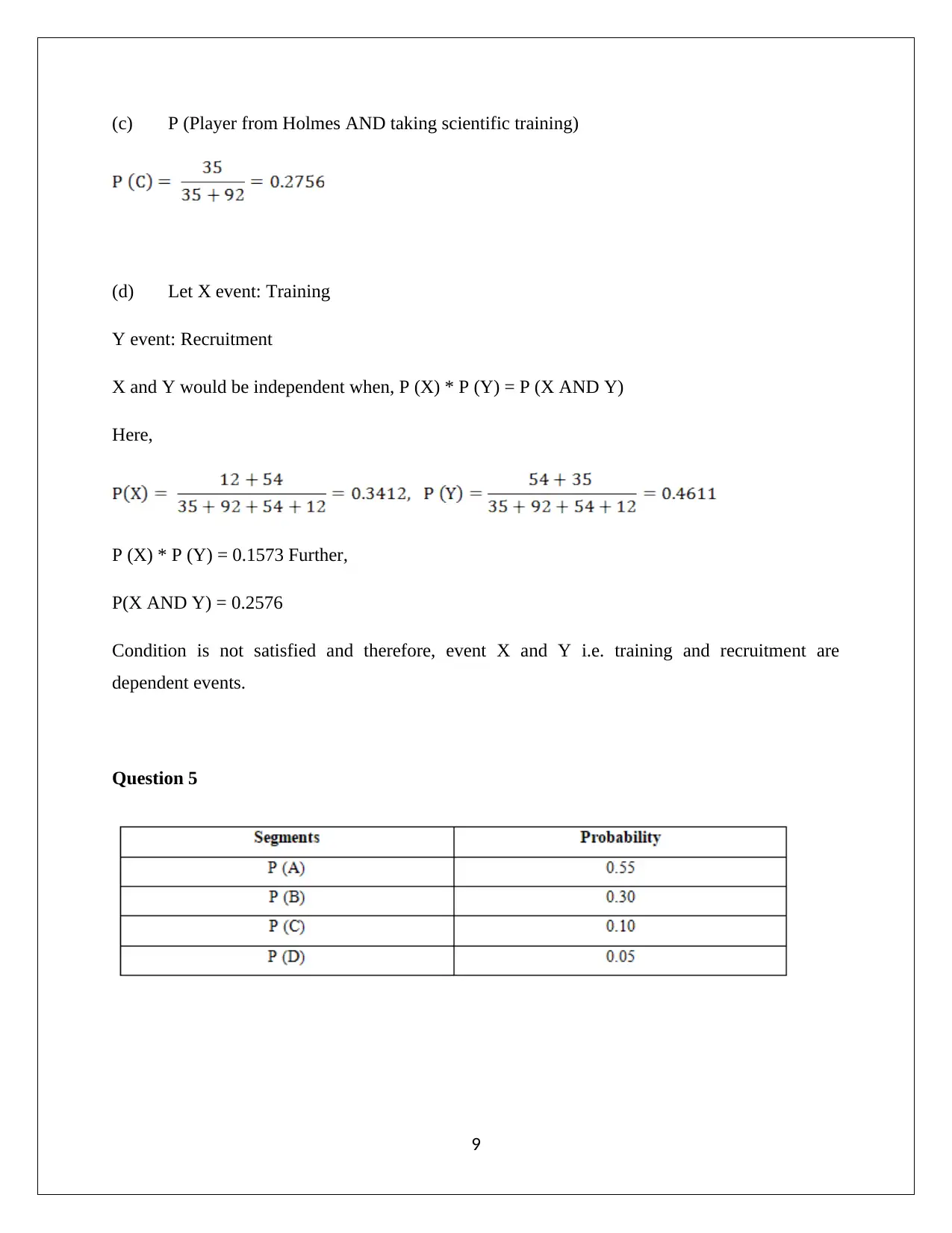
(c) P (Player from Holmes AND taking scientific training)
(d) Let X event: Training
Y event: Recruitment
X and Y would be independent when, P (X) * P (Y) = P (X AND Y)
Here,
P (X) * P (Y) = 0.1573 Further,
P(X AND Y) = 0.2576
Condition is not satisfied and therefore, event X and Y i.e. training and recruitment are
dependent events.
Question 5
9
(d) Let X event: Training
Y event: Recruitment
X and Y would be independent when, P (X) * P (Y) = P (X AND Y)
Here,
P (X) * P (Y) = 0.1573 Further,
P(X AND Y) = 0.2576
Condition is not satisfied and therefore, event X and Y i.e. training and recruitment are
dependent events.
Question 5
9
Paraphrase This Document
Need a fresh take? Get an instant paraphrase of this document with our AI Paraphraser
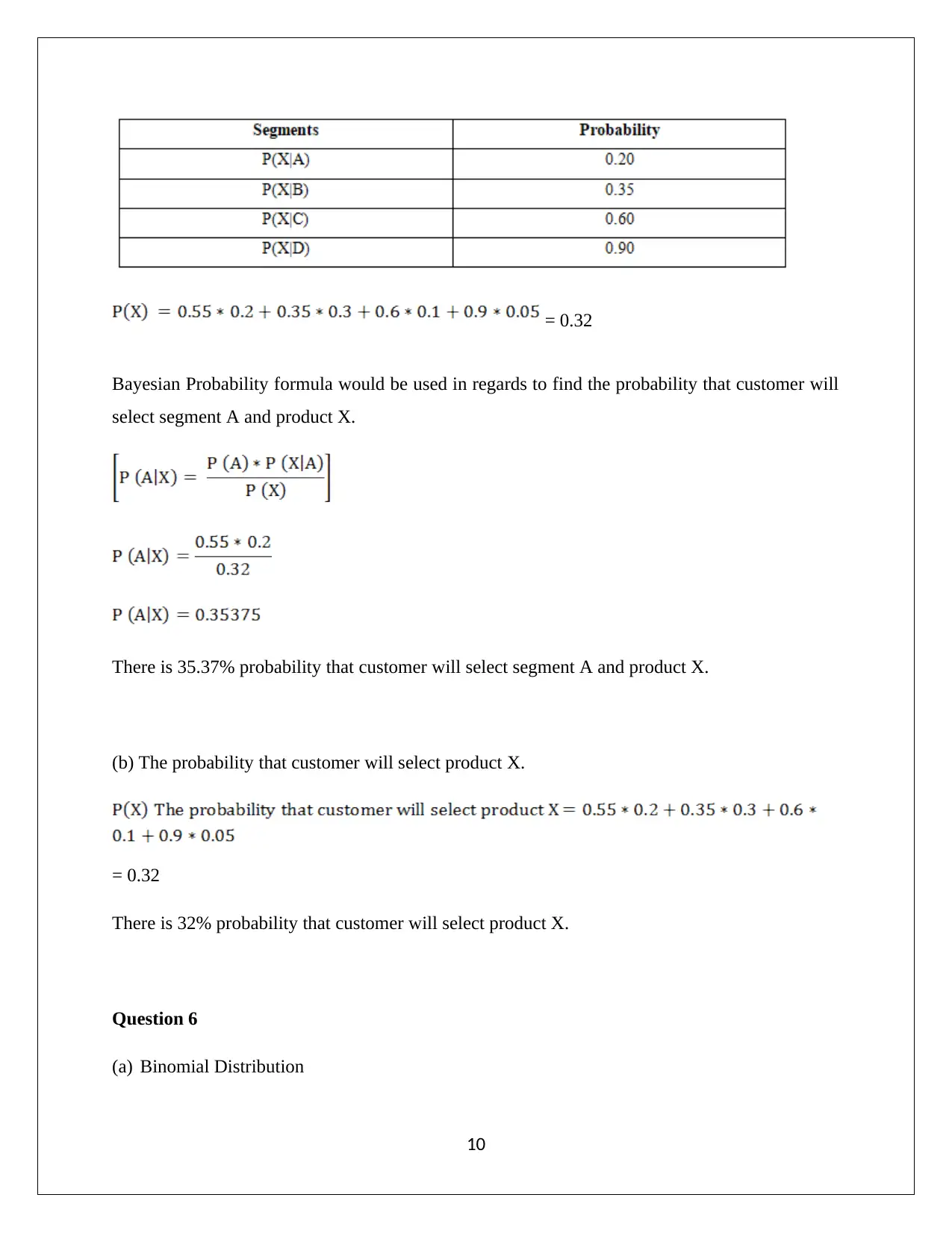
= 0.32
Bayesian Probability formula would be used in regards to find the probability that customer will
select segment A and product X.
There is 35.37% probability that customer will select segment A and product X.
(b) The probability that customer will select product X.
= 0.32
There is 32% probability that customer will select product X.
Question 6
(a) Binomial Distribution
10
Bayesian Probability formula would be used in regards to find the probability that customer will
select segment A and product X.
There is 35.37% probability that customer will select segment A and product X.
(b) The probability that customer will select product X.
= 0.32
There is 32% probability that customer will select product X.
Question 6
(a) Binomial Distribution
10
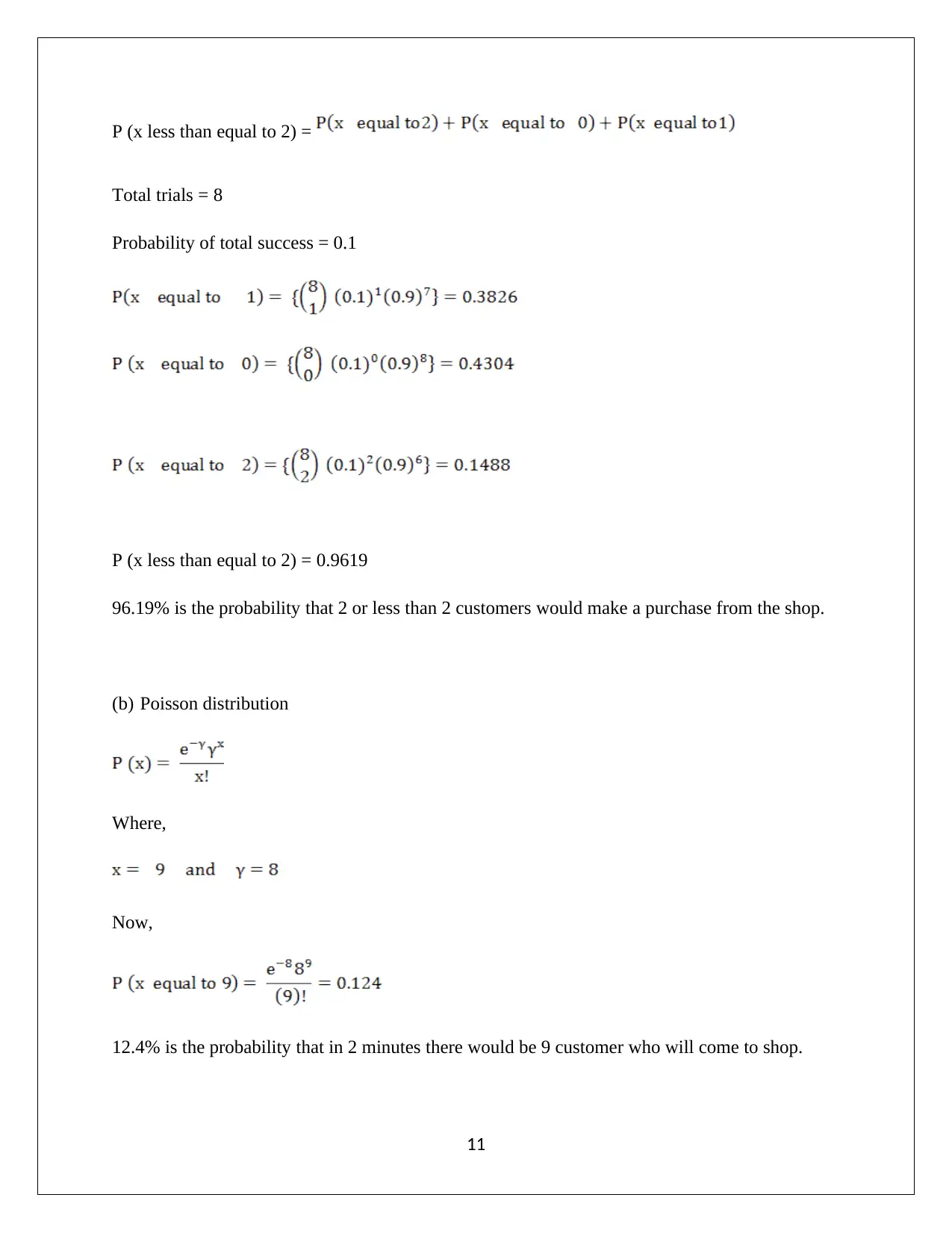
P (x less than equal to 2) =
Total trials = 8
Probability of total success = 0.1
P (x less than equal to 2) = 0.9619
96.19% is the probability that 2 or less than 2 customers would make a purchase from the shop.
(b) Poisson distribution
Where,
Now,
12.4% is the probability that in 2 minutes there would be 9 customer who will come to shop.
11
Total trials = 8
Probability of total success = 0.1
P (x less than equal to 2) = 0.9619
96.19% is the probability that 2 or less than 2 customers would make a purchase from the shop.
(b) Poisson distribution
Where,
Now,
12.4% is the probability that in 2 minutes there would be 9 customer who will come to shop.
11
You're viewing a preview
Unlock full access by subscribing today!
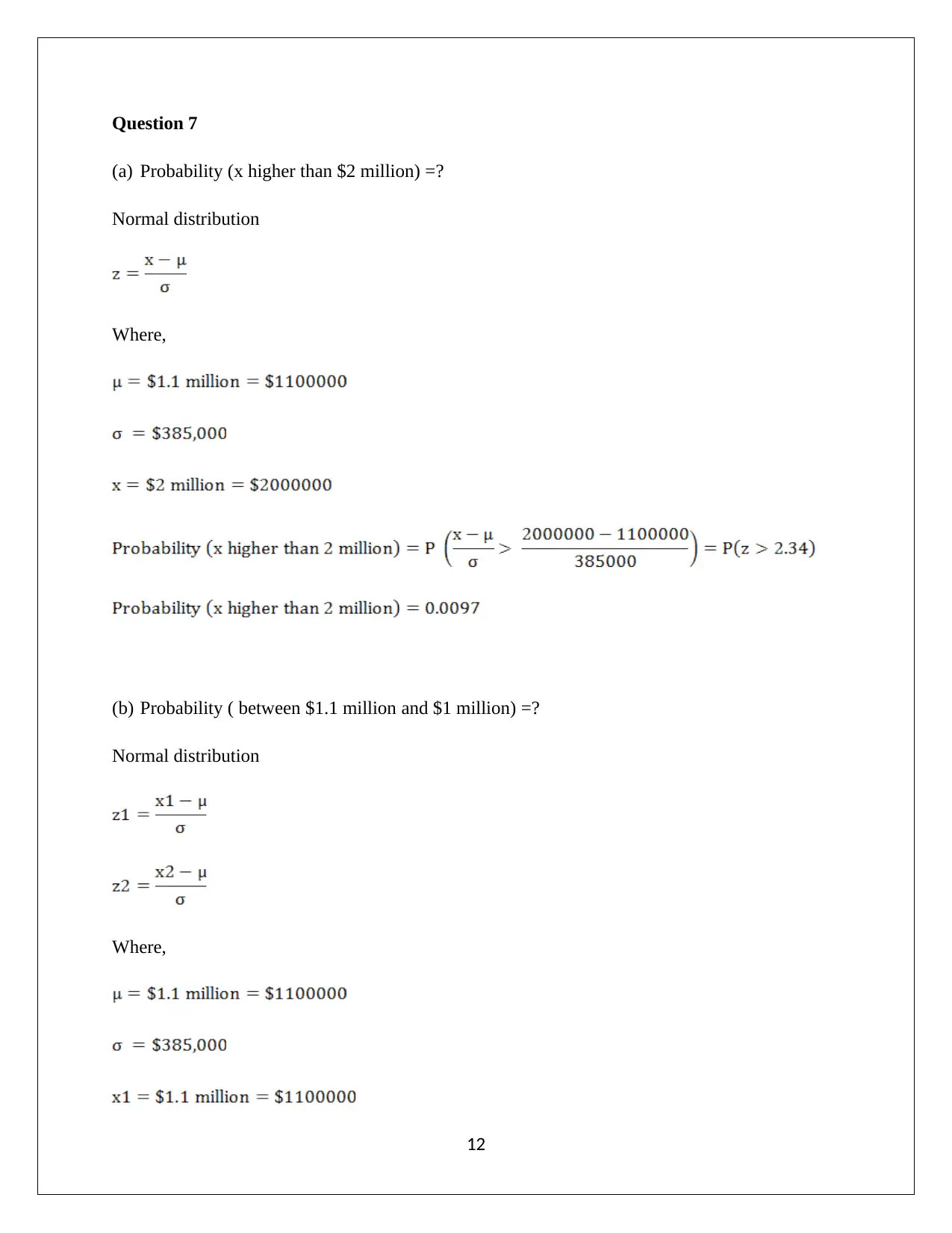
Question 7
(a) Probability (x higher than $2 million) =?
Normal distribution
Where,
(b) Probability ( between $1.1 million and $1 million) =?
Normal distribution
Where,
12
(a) Probability (x higher than $2 million) =?
Normal distribution
Where,
(b) Probability ( between $1.1 million and $1 million) =?
Normal distribution
Where,
12
Paraphrase This Document
Need a fresh take? Get an instant paraphrase of this document with our AI Paraphraser

Question 8
(a) The key question is whether z can be sued as test statistic or not. This would essentially
depend on the sample sie since when the sample size is large, an assumption can be made
that the distribution is normal. In this regards, the minimum sample size is considered to be
30 as envisaged by the Central Limit Theorem. This condition is fulfilled here and hence the
use of z for analysis is permissible.
(b) Total investors = 45
Investors agree to invest = 11
Now,
13
(a) The key question is whether z can be sued as test statistic or not. This would essentially
depend on the sample sie since when the sample size is large, an assumption can be made
that the distribution is normal. In this regards, the minimum sample size is considered to be
30 as envisaged by the Central Limit Theorem. This condition is fulfilled here and hence the
use of z for analysis is permissible.
(b) Total investors = 45
Investors agree to invest = 11
Now,
13
1 out of 14
Related Documents
Your All-in-One AI-Powered Toolkit for Academic Success.
+13062052269
info@desklib.com
Available 24*7 on WhatsApp / Email
![[object Object]](/_next/static/media/star-bottom.7253800d.svg)
Unlock your academic potential
© 2024 | Zucol Services PVT LTD | All rights reserved.



![HA1011 Applied Quantitative Methods Assignment Solution - [Date]](/_next/image/?url=https%3A%2F%2Fdesklib.com%2Fmedia%2Fimages%2Fqz%2Fdfe58fc0a1774dbb8e3fa05e31ee0273.jpg&w=256&q=75)

